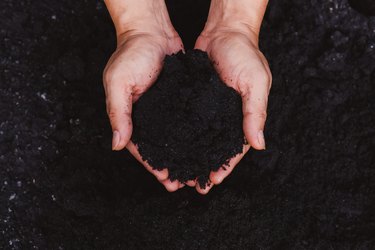
Some soils are considered acidic while others are considered alkaline. If you plan to add cow manure to your soil, it is important to know cow manure pH and the ideal pH range for the plants you plan to grow. Most plants prefer growing on slightly acidic soils and potting soils are usually within this range. Cow manure, when used as a soil amendment, can affect a soil's pH level.
The pH Scale
Video of the Day
Soil scientists use the pH scale to get an exact measure of a soil's acidity. The pH scale measures a substance's hydrogen potential, which simply refers to the acid/alkaline balance. The higher the potential, the "sweeter," or more alkaline, the soil. Low potentials indicate that the soil is acid.
Video of the Day
The pH scale is measured on a scale of 1 to 14. The lower the number, the more acidic; the higher the number, the more alkaline. The number 7 indicates the neutral range. Most plants grow best in the neutral to slightly acidic range.
Is Cow Manure Acidic?
Cow manure is high in nitrogen but also contains phosphorous and potassium. These nutrients, combined with manure's organic bulk, enrich and lighten soil. Clay soils become less compacted while porous soils are more able to retain moisture and nutrients. Clay soils tend to have higher acid levels than porous soils, which lean toward alkaline levels.
Cow manure has an acidifying effect on soils. When aged cow manure is incorporated into clay soils, it can increase the already acidic soil to levels that will not support healthy plant development. Adding manure to alkaline soils can increase the soil's acidity over time and help plant development. The manure's pH level depends on the type of food the cow has eaten, and the manure's age, purity, and other variables.
Potting Soil pH Levels
Potting mixes combine many different materials, each with a different purpose. Sand acts as a buffering agent and helps water drainage. Peat moss and other mosses are highly acidic bulking agents that aid water retention. Minerals provide nutrients. Some potting mixes contain guano and other slow-release fertilizers for additional nutrients.
Is potting soil acidic? Potting mixes do not usually display the pH balance, but you can buy test strips to determine that information. Most potting mixes fall within the neutral pH range, with each ingredient contributing to the mix's overall pH level. For example, the Arizona Cooperative Extension notes that peat moss has a pH of 3.5 to 4.5, but vermiculite has a pH of 6.5 to 7.2.
Specialized plants, such as cacti and succulents, have different needs, in pH and nutrients. Purchasing mixes tailored to meet the needs of a particular plant encourages healthy growth. The pH balance can change depending on how your plant grows, how frequently you water it, and the type of plant you have in the pot.
Soil pH Considerations
Before amending your soil and adjusting its pH balance, submit soil samples for analysis through your local university extension. The results provide information on your soil's pH balance and formula recommendations for soil improvement.
Amendments such as lime, sulfur, and copper will adjust your soil's pH balance, and help to bring it into a neutral zone. Follow the instructions carefully. Incorrect amendment application can damage soil structure for decades.